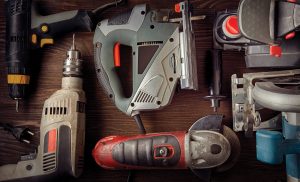
 Many of us tackle handyman projects around the house all year long. It may be as simple as repairing a loose board on your deck’s steps or as complex as building a whole new deck.
Many of us tackle handyman projects around the house all year long. It may be as simple as repairing a loose board on your deck’s steps or as complex as building a whole new deck.
What do we use to make these repairs? Power tools.
Every handyman or handywoman loves a good power tool. Some of us will have garages full of them; others may have only a few. No matter how many you own, there are some basic safety tips we need to keep in mind whenever we use them.
Today’s power tools add productivity and convenience in so many ways. They’re safe as long as they’re used correctly and you follow some basic safety tips. Make sure tools are properly grounded (never remove or cut off the grounding prong on a plug) and double-insulated and that they’re approved by safety organizations. Unplug them before changing attachments and keep safety devices such as guards intact. Ground-fault circuit interrupter (GFCI) outlets provide important protection outdoors or in damp settings. Always use a GFCI outlet when using power tools outside or near water. Use a portable GFCI if your outdoor outlets don’t have them.
Power tools have become so familiar that it’s easy to forget that there are hazards associated with their use. Keep those hazards in mind every time you use the tools.
Please remember these basic power tool safety tips:
- Always read, understand and follow the instruction manual before attempting to use a power tool. Also, read the nameplate information and follow the warning labels on the tool itself.
- Wear safety goggles or safety glasses with side shields. Use a dust mask for dusty operations, and wear hearing protection if you’ll be using a tool for an extended period of time.
- Make sure cutters or blades are clean, sharp and securely in place. Never use bent, broken or warped blades or cutters.
- Use only tools that are approved for the specific task by an organization such as Underwriters Laboratories (UL) or the Occupational Safety and Health Administration (OSHA).
- Always make sure tools are turned off before connecting them to power.
- Disconnect the power supply when changing attachments, blades or bits to ensure that the tool doesn’t start unexpectedly.
- Verify that tools are double-insulated or properly grounded and always plug tools with a three-prong plug into a grounded three-wire outlet.
- If you’re working outdoors or in a damp location, be sure to use an outlet with a GFCI.
- When you unplug a power tool, pull the plug, rather than the cord to prevent damage to the plug.
- Never use flammable solvents to clean power tools.
- If a tool appears to be sparking or operates erratically, replace it.
- Don’t carry power tools by their cords.
- Never use a tool that is damaged or malfunctioning in any way.
- When using power tools near water, take extra safety precautions. If you drop a tool into water (even a puddle), disconnect the power before attempting to retrieve the tool.
- Be careful when cutting or drilling into walls because there may be electrical cords or water lines behind them.
- Do not lean your body against grounded surfaces such as water pipes or appliances when using electric tools because a short circuit could cause a dangerous shock.
- If you need an extension cord, use one that is rated for the power tool’s requirements and the environment.
- Never use a power tool with a damaged cord or wiring that’s been exposed.
Finally, remember to let the tool do most of the work. If you try to force a power tool or put additional torque on it, you’ll put extra stress on the motor. That could cause it to break down a lot sooner.
We all want to finish our projects as quickly as possible, but always take that little extra time for safety. If you rush it, it could be the last project you’ll ever do. Please be safe and thanks for reading.
GREG BITTERLING is member services manager and energy advisor at Fulton County REMC.



